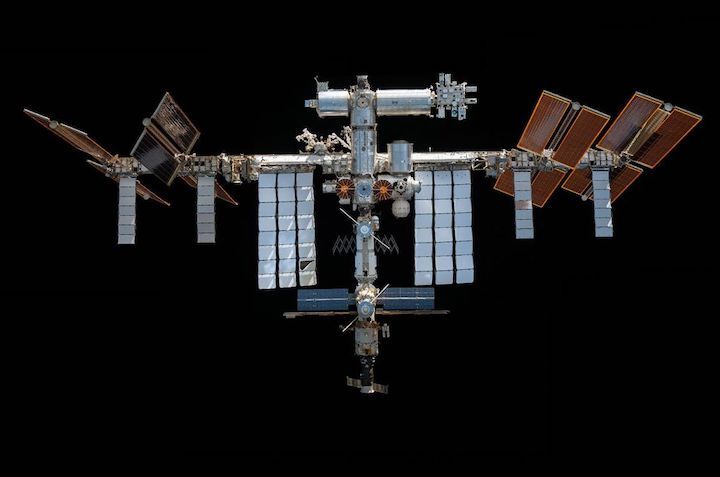5.04.2022
Russian space chief Dmitry Rogozin wants sanctions against his country lifted.

Russia has once again threatened to end its cooperation with the West on the International Space Station (ISS) program.
Dmitry Rogozin, the head of Russia's federal space agency Roscosmos, decried the sanctions imposed by the United States, Japan, Canada and the European Union — the other ISS partners — on his nation because of its invasion of Ukraine.
"The purpose of the sanctions is to kill the Russian economy, plunge our people into despair and hunger and bring our country to its knees," Rogozin said via Twitter on Saturday (April 2). (He tweeted in Russian; translation provided by Google.)
"I believe that the restoration of normal relations between partners in the International Space Station and other joint projects is possible only with the complete and unconditional lifting of illegal sanctions," he added in another tweet.
Rogozin also apparently made this or a similar complaint to the ISS partner agencies in a formal fashion on March 14; on Saturday, he posted on Twitter what he said were some partners' responses to a letter of that date.
For example, Rogozin shared what he said was a March 30 letter from NASA Administrator Bill Nelson.
"The U.S. continues to support international government space cooperation, especially those activities associated with operating the ISS with Russia, Canada, Europe, and Japan," Nelson's letter states, in part. "New and existing U.S. export control measures continue to allow cooperation between the U.S. and Russia to ensure continued safe operations of the ISS."
Rogozin's recent tweets do not necessarily mean that the ISS program is in immediate danger of dissolution; the Russian space chief is a blustery figure with a history of hyperbolic statements.
For example, on Feb. 24 — the day that Russia invaded Ukraine — Rogozin said that newly imposed economic sanctions could "destroy" the ISS partnership. But it has been more or less business as usual aboard the orbiting lab since then. On March 30, for example, NASA astronaut Mark Vande Hei came back to Earthin a Russian Soyuz spacecraft with two cosmonauts. The landing went off without a hitch despite the heightened geopolitical tensions.
Quelle: SC
+++
Rogozin delays decision on space station future
DENVER — After Western nations refused his demand to end sanctions on Russian companies involved in the International Space Station, the head of Roscosmos said he will make recommendations in the “near future” on Russia’s continued participation in the station, but there are no signs of any near-term changes in station operations.
Dmitry Rogozin had set a March 31 deadline for the United States and other Western nations to lift sanctions on two Russian companies, TsNIMash and Rocket and Space Centre Progress, that support ISS operations. Rogozin warned in March he would make a decision of some kind if sanctions were not lifted, but declined to elaborate on the decision.
In a lengthy Twitter thread April 2, Rogozin posted letters he received from NASA Administrator Bill Nelson, Canadian Space Agency President Lisa Campbell and European Space Agency Director General Josef Aschbacher. As expected, none announced that the sanctions were being lifted.
Nelson, in his letter, stated that “U.S. export control measures continue to allow cooperation between the U.S. and Russia to ensured continued safe operations of the ISS.” NASA stated in February, when the White House imposed its first set of sanctions against Russia for its invasion of Ukraine, that ISS was excluded from the sanctions.
Campbell said her agency has no “direct cooperation” with the sanctioned Russian companies but would work with the Canadian government to ensure safe ISS operations. Aschbacher responded that sanctions are the responsibility of ESA’s 22 member states.
“I consider this state of affairs unacceptable,” Rogozin said in a translation of his Russian-language tweets. “I believe that the restoration of normal relations between partners in the International Space Station and other joint projects is possible only with the complete and unconditional lifting of illegal sanctions.”
However, he took no step to end current cooperation on the ISS, despite some media reports to the contrary. Instead, he said that Roscosmos would make proposals on “the timing of the completion of cooperation” on the ISS to Russian leadership “in the near future.”
NASA officials have emphasized since Russia’s invasion of Ukraine that there had been no changes in the day-to-day operations of the ISS. That included the March 30 landing of a Soyuz spacecraft carrying NASA astronaut Mark Vande Hei along with two Russian cosmonauts. The recovery operations in Kazakhstan looked no different from for previous Soyuz landings, and Vande Hei was back in Houston about 24 hours after landing via a NASA jet.
“I was really excited to see Mark Vande Hei land,” NASA Deputy Administrator Pam Melroy said in a March 30 interview hours after his landing. “That just goes to show this is a very professional relationship on both sides, and we are continuing the business of the space station.”
Those routine operations include discussions with Roscosmos and other partners to extend ISS operations from 2024 to 2030. Kathy Lueders, NASA associate administrator for space operations, said a multilateral control board meeting of the ISS partners was scheduled for June to discuss efforts by the partners to extend the ISS to 2030. “All our international partners, including Roscosmos, are making progress on moving towards station extension through 2030,” she said at a March 31 briefing about the Crew-4 mission to the station, scheduled to launch April 20.
“We are certainly not immune to the geopolitical situation right now. These are very challenging times,” said NASA astronaut Kjell Lindgren, commander of Crew-4, at a briefing later that day. He said he and his crew were focused on space station operations and research. “We very much look forward to getting on orbit and working with our Russian colleagues, our friends up there, and having a safe and successful mission and getting everybody back home safely.”
Quelle: SN
